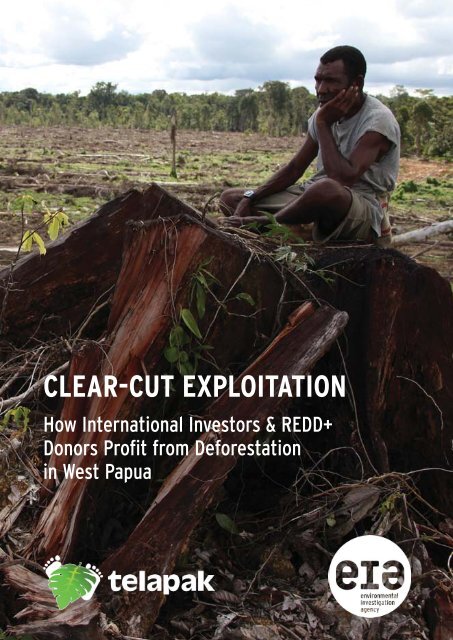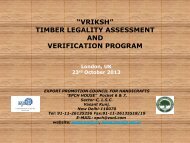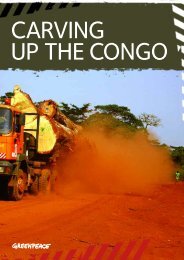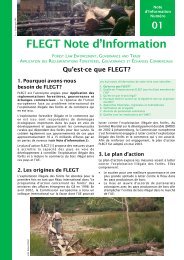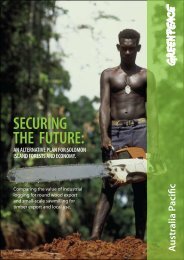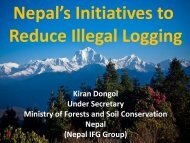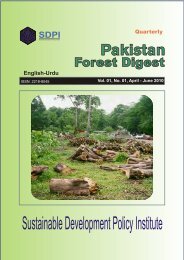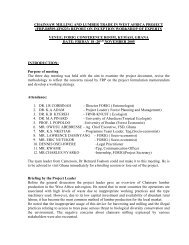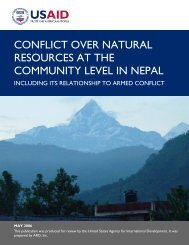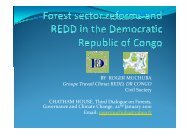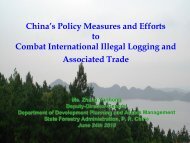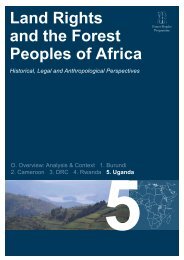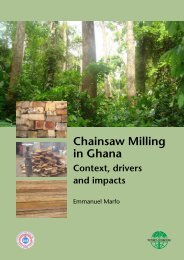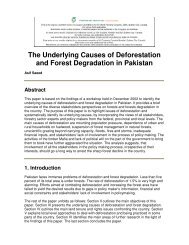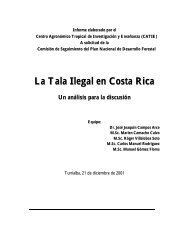CLEAR-CUT EXPLOITATION - Environmental Investigation Agency
CLEAR-CUT EXPLOITATION - Environmental Investigation Agency
CLEAR-CUT EXPLOITATION - Environmental Investigation Agency
Create successful ePaper yourself
Turn your PDF publications into a flip-book with our unique Google optimized e-Paper software.
<strong>CLEAR</strong>-<strong>CUT</strong> <strong>EXPLOITATION</strong><br />
How International Investors & REDD+<br />
Donors Profit from Deforestation<br />
in West Papua
ACKNOWLEDGEMENTS<br />
EIA would like to thank the Rufford Foundation<br />
and the Norwegian <strong>Agency</strong> for Development<br />
Cooperation (NORAD) for their support.<br />
EIA/Telapak would also like to thank PT Triton<br />
Papua for research assistance in Sorong.<br />
Report design by:<br />
www.designsolutions.me.uk<br />
May 2012<br />
FRONT & BACK COVER:<br />
Most Moi tribe members are merely<br />
observers as external investors<br />
transform their world © EIA<br />
BELOW:<br />
Clear-cutting up to rivers in PT<br />
Henrison Inti Persada's oil palm<br />
concession in Klawana, Sorong,<br />
May 2011.<br />
SUMMARY<br />
• Indigenous landowners in Sorong, West Papua province, are being<br />
exploited by the Kayu Lapis Indonesia Group (KLI) for plantations<br />
development – at great cost to them and their forests.<br />
• Documents obtained by EIA/Telapak reveal “land rental” agreements<br />
provide Moi landowners with as little as US$ 0.65 per hectare –<br />
land projected to be worth US$ 5,000 per hectare once developed.<br />
• Timber payments are equally bad: KLI has paid landowners as little<br />
as US $25 per cubic metre of merbau – wood KLI sells for US$ 875<br />
on export.<br />
• Legal norms in permit allocation and timber harvesting have been<br />
routinely flouted, with little to no law enforcement by either the<br />
national or provincial government.<br />
• International investors – including Norway’s Government Pension<br />
Fund Global (GPFG) – are profiting from the situation. This highlights<br />
a failure to incorporate commodity and investment market<br />
reforms into the REDD+ agenda, resulting in the perverse financial<br />
incentives of those markets continuing to undermine efforts to<br />
reduce deforestation and deliver sustainable development for<br />
Indonesia's indigenous peoples.<br />
© EIA<br />
1
<strong>EXPLOITATION</strong> OF INDIGENOUS<br />
MOI TRIBE LANDOWNERS<br />
© EIA<br />
In an April 2009 investigation into the<br />
impacts of plantations expansion on the<br />
environment and indigenous peoples of<br />
Papua and West Papua provinces, EIA<br />
and Telapak interviewed Moi landowners<br />
in Sorong, West Papua province, who<br />
had released land to two oil palm<br />
plantation companies - PT Henrison<br />
Inti Persada (PT HIP) and PT Inti<br />
Kebun Sejahtera (PT IKS). 1<br />
Both plantations were set up by the<br />
Sutanto family, owners of the Kayu<br />
Lapis Indonesia Group (KLI).<br />
The 2009 fieldwork documented<br />
testimony of exploitative practices by<br />
PT HIP and PT IKS during land<br />
acquisition. Highly one-sided negotiations<br />
were characterised by persuasion and<br />
pressure from company staff backed by<br />
local government officials and, at times,<br />
intimidation from military and police.<br />
Landowners unanimously reported they<br />
had initially agreed to release large<br />
areas following up-front cash offers, but<br />
also largely due to company promises of<br />
benefits such as new houses, vehicles,<br />
and free education for their children.<br />
In 2011, EIA/Telapak returned to Sorong,<br />
hearing of continued dissatisfaction,<br />
uncovering new evidence of shockingly<br />
low land compensation agreements and<br />
documenting significant new forest<br />
clearance and other problems.<br />
EIA/Telapak also informed landowners<br />
of the new corporate and sovereign<br />
wealth fund owners of their land, and<br />
the huge profits these external actors<br />
will likely make.<br />
60 CENTS (PER HECTARE)<br />
In 2009, EIA/Telapak heard that no<br />
landowners had been able to retain<br />
copies of land rental ‘contracts’ signed<br />
with PT HIP or PT IKS. However, in<br />
2011 investigators acquired one such<br />
contract, exposing the true extent of<br />
exploitation by PT HIP.<br />
The ‘contract‘ - hastily hand-scrawled on<br />
notepad paper - is signed by PT HIP<br />
General Manager Agnes Winaryati and<br />
thumbprint-signed by the head of the<br />
Gilik clan. It states: “on October 13th<br />
2006, it was agreed to release indigenous /<br />
customary land of the Gilik Clan covering<br />
1,420 hectares with a yield [return] of Rp.<br />
8,500,000 (eight million five hundred<br />
thousand rupiah) and money for betel nut<br />
for an indigenous ceremony equalling Rp.<br />
4,000,000 (four million rupiah)”.<br />
The document evidences how,<br />
discounting the Rp.4 million (US$ 434)<br />
for a tribal ceremony, the Gilik clan<br />
of Malalis village received a one-off<br />
payment of US$923 (Rp. 8,500,000) for<br />
14.2 square kilometers of forest lands –<br />
equivalent to just US$65 per square<br />
kilometer, or US$0.65 per hectare.<br />
While the “release” period is not<br />
stipulated, the company will hold its<br />
official permit for 25-35 years, with a<br />
guaranteed extension if it chooses.<br />
TOP:<br />
Uprooted: Manu Gisim surveys<br />
the devastation on his land.<br />
ABOVE:<br />
A 2006 land rental “contract”<br />
details compensation of merely<br />
US$0.65 per hectare.<br />
“The Gilik clan<br />
received merely<br />
US$923 for 14.2<br />
square kilometers<br />
of forest lands -<br />
US$0.65 per<br />
hectare”<br />
© PT Triton Papua<br />
2
© EIA<br />
ABOVE:<br />
In 2006, Kefas Gisim's son,<br />
Manu (left), had to sign a land<br />
contract. He was four years old.<br />
CHILDREN SIGNING CONTRACTS<br />
In 2009, the Gisim family in Klamono<br />
testified how in 2006, at the age of<br />
four, oldest son Manu Gisim was<br />
persuaded to sign a contract with<br />
PT HIP so that if his father died the<br />
company had evidence the next<br />
generation had released their land.<br />
While the family had tried to preserve<br />
areas of forest and had erected<br />
blockades to stop land clearance, the<br />
company bulldozed and cleared more<br />
land than agreed.<br />
When EIA/Telapak visited the family<br />
in 2011, they confirmed none of the<br />
promised benefits – such as a house and<br />
schooling – had to date been honoured.<br />
PROMISED EDUCATION<br />
RESTRICTED<br />
Education was the key reason<br />
landowners cited for providing lands to<br />
PT HIP and PT IKS. Local schools are<br />
expensive and of poor quality. However,<br />
it has emerged the offer may be strictly<br />
limited, and comes with conditions<br />
verging on indentured labour.<br />
In February 2011, the Citra Widya<br />
Education Oil Palm Polytechnic<br />
announced that 89 local high school<br />
graduates from PT HIP’s plantation<br />
areas in Klamono, Aimas, and Salawati<br />
had been tested in formal examinations;<br />
those who passed would be further<br />
interviewed for “suitability”.<br />
Only students passing the selection<br />
process will be offered three years of<br />
further education and lodgings at the<br />
polytechnic in Java. Further, while PT<br />
HIP will finance the scheme under its<br />
“CSR program”, those students selected<br />
are subsequently obliged to work for PT<br />
HIP for seven years. An average of only<br />
five students a year have been educated<br />
in this fashion since 2007. 2<br />
The vast majority of children of those<br />
landowners who provided land to PT<br />
HIP will not benefit at all from this<br />
polytechnic-level education, and those<br />
benefiting do so only because PT HIP<br />
sees their value as future employees.<br />
LEGAL IRREGULARITIES IN<br />
PLANTATION PERMITTING PROCESSES<br />
© Landsat 7 ETM+ Images<br />
3<br />
ABOVE:<br />
Landsat images of PT HIP's<br />
plantation from 2003 (left),<br />
2008 (middle), an 2011 (right).<br />
EIA/Telapak research has highlighted a<br />
systematic pattern of legal irregularities<br />
in the licensing procedures surrounding<br />
both PT HIP and PT IKS.<br />
In the case of PT HIP, satellite images<br />
(see above) clearly demonstrate that<br />
forest clearance began illegally in 2003<br />
– one year before the company’s IUP<br />
(Plantation Operation Permit) for 32,500<br />
hectares was issued in November 2004, 3<br />
and two years before the Ministry of<br />
Forestry finally released the land from<br />
the forest estate in July 2006. 4 Under the<br />
prevailing law at the time, the maximum<br />
area a company could develop in a<br />
single province was 20,000 hectares 5 –<br />
a factor completely ignored by the<br />
government and company.<br />
PT IKS also began illegal clearance in<br />
January 2008, before an IUP for 38,300<br />
hectares was issued on September 5,<br />
2008. 6 Landowners testified how the<br />
environmental impact assessment<br />
(AMDAL) – a legal requirement before<br />
an IUP can be issued under the newer<br />
2007 plantation law that prevailed when<br />
PT IKS was processing its permits 7 –<br />
did not take place until September 2008.<br />
IPK permits – allowing the utilisation of<br />
timber from forests cleared for plantations<br />
– cannot be issued without a forest<br />
relinquishment approval letter (SPKH)<br />
from the Ministry of Forestry. 8 Yet from<br />
early 2008 countless truckloads of logs<br />
from PT IKS’ plantation were delivered<br />
to PT Henrison Iriana, the local plywood
and saw mill of the Kayu Lapis<br />
Indonesia (KLI) Group. Ministry of<br />
Forestry records indicate that a<br />
“principle” or preliminary approval to<br />
release 20,075ha of land from the forest<br />
estate was issued for PT IKS in October<br />
2009, 9 but that as of June 2011, the<br />
company still had not received a full<br />
SPKH, 10 as required by law.<br />
Loggers extract<br />
valuable hardwood prior<br />
to forest clearance.<br />
The same illegality occurred in the PT<br />
HIP plantation between 2003, when<br />
clearance began illegally before the<br />
plantation permit was issued, and 2006.<br />
In 2006, then-Forestry Minister MS<br />
Kaban recommended that KLI’s<br />
Sorong logging subsidiary PT Intimpura<br />
should “answer questions” concerning<br />
utilisation of illegal timber from 400ha<br />
of Moi land within the PT HIP concession,<br />
and instructed the head of the West<br />
Papua Forestry and Agriculture Office<br />
to “evaluate and revoke” KLI’s wood<br />
utilisation permits. 11 The timber from<br />
PT HIP was also sent by PT Intimpura<br />
to PT Henrison Iriana’s plywood mill<br />
in Sorong.<br />
To date, none of the Government officials<br />
or the companies involved in either<br />
plantation – all controlled by the<br />
powerful Sutanto family – have ever<br />
been prosecuted for systematic illegal<br />
logging, and products have been sold<br />
onto international markets.<br />
International trade records indicate<br />
that between December 2007 and May<br />
2008, PT Henrison Iriana shipped 33<br />
consignments of plywood to one of the<br />
US’s biggest independent plywood<br />
traders. 12<br />
Between 2008 and 2011, KLI exports<br />
of valuable merbau wood (Intsia Spp.)<br />
products amounted to 8,000 tons (about<br />
9,000m 3 ), earning the company just<br />
under US$ 9 million. Nearly 4,000m 3<br />
(worth about US$ 3.5 million) of KLI’s<br />
merbau exports were shipped to Australia<br />
– a major consumer of merbau. 13 KLI<br />
would have sourced this merbau from its<br />
Papua concession base, including from<br />
the PT HIP and PT IKS areas. Average<br />
KLI group merbau product export values<br />
equalled approximately US$ 875 per<br />
cubic metre.<br />
Timber returns for Papuan landowners<br />
who have “leased” land to PT HIP and<br />
PT IKS are significantly lower. One<br />
landowner informed EIA/Telapak that<br />
PT IKS had paid merely Rp. 25,000<br />
(US$25) per cubic metre of timber,<br />
including for valuable merbau, and that<br />
from 300 hectares of forest they had<br />
received merely US$ 5,000. This equates<br />
to merely 6.6 cubic metres per hectare –<br />
far lower than the 16.5 cubic metres per<br />
hectare PT HIP was licensed to harvest<br />
Timber revenue distribution in Kayu Lapis Indonesia’s<br />
(KLI’s) Sorong plantations (US$ per cubic metre)<br />
KLI payments to Moi landowners for merbau wood on<br />
their land<br />
Price attained by KLI Group on export of semi-finished<br />
merbau products<br />
US$ 25<br />
US$ 875<br />
in similar forests. 14 4<br />
© EIA
INTERNATIONAL INVESTORS<br />
& REDD+ DONORS CASH IN<br />
© EIA<br />
“The Noble Group’s<br />
ownership of PT HIP<br />
drags Norway into<br />
the exploitative<br />
deforestation<br />
occurring in West<br />
Papua province.”<br />
During the May 2011 visit to Sorong,<br />
EIA/Telapak updated Moi landowners<br />
on significant developments in the<br />
ownership of the PT HIP plantation<br />
on their land, and the huge profits<br />
international investors – including<br />
Norway’s US$570 billion sovereign<br />
wealth fund – would reap. Moi tribe<br />
landowners were completely unaware<br />
of any of these developments.<br />
These two Sorong plantations appear to<br />
have been strategically separated from<br />
the wider KLI Group by incorporating<br />
them into a company called Kalia Agro. 15<br />
EIA believes this may have been done<br />
to safeguard the Sutanto family’s multimillion<br />
dollar plantations assets from<br />
the group’s US$140 million in<br />
outstanding debts, due to be repaid to<br />
bank Mandiri from 2011. 16<br />
NOBLE INTENTIONS<br />
Comparative Distribution of PT HIP’s Value<br />
Payments to Moi tribe landowners in 2006<br />
Value at date of Noble Group’s 2010 acquisition<br />
Projected Plantation value once developed<br />
In mid-June 2010, the Hong Kong-headquartered<br />
Noble Group made its first<br />
foray into oil palm plantation ownership,<br />
buying a majority 51 per cent stake in<br />
PT HIP. 17 With 2011 revenues exceeding<br />
US$88 billion and 2010 profits of over<br />
US$600 million, 18 Noble is a huge<br />
Singapore stock exchange-listed<br />
commodities trading corporation.<br />
US$<br />
Per hectare<br />
US$0.64<br />
US$5,000<br />
US$ for total<br />
32,400 hectare<br />
plantation<br />
US$20,736<br />
US$48,303,000<br />
US$162,000,000<br />
Noble’s 2010 annual report reveals it<br />
paid US$24,525,000 (Rp.276.7 billion)<br />
for control of PT HIP, estimating the<br />
plantation firm’s tangible assets at<br />
US$48,303,000, including “cash and cash<br />
equivalent of US$19,963,000, agricultural<br />
assets of US$46,060,000 and property,<br />
plant and equipment of US$7,666,000”. 19<br />
Media coverage of Noble’s PT HIP<br />
acquisition suggested the plantation<br />
could be worth US$162 million once<br />
developed, based on a US$5,000 per<br />
hectare biological asset baseline. 20<br />
While Noble’s PT HIP acquisition press<br />
release only referenced the 32,500ha<br />
concession in Sorong, in 2011<br />
EIA/Telapak learned from Government<br />
sources in Sorong that PT HIP also<br />
owns or controls the 38,300ha<br />
plantation of PT IKS. Indeed, the<br />
website of Kalia Agro, which promotes<br />
PT IKS, is actually registered by PT<br />
HIP, 21 and the palm oil refinery PT<br />
HIP is building in Klasafet will also<br />
process palm fruits from the PT IKS<br />
plantation, massively increasing PT<br />
HIP’s value.<br />
With Moi landowners receiving as little<br />
as US$0.6 per hectare from PT HIP, the<br />
perversities are clear and highlight the<br />
utter failure of Indonesia’s and West<br />
Papua’s governments to safeguard the<br />
interests of citizens, particularly the<br />
fragile and marginalised indigenous<br />
communities supposedly protected<br />
under the Province’s so-called Special<br />
Autonomy provisions.<br />
NORWEGIAN WOODS<br />
Ironically, Noble’s ownership of PT HIP<br />
drags Indonesia’s biggest REDD+ donor<br />
into the exploitative deforestation<br />
occurring in West Papua province.<br />
5
In December 2009, Norway’s<br />
Government Pension Fund - Global<br />
(GPFG) – the world’s largest sovereign<br />
wealth fund – held US$38,973,707 of<br />
shares in the Noble Group, having<br />
increased its stake nearly tenfold from<br />
December 2008 holdings of US$3.9<br />
million. 22 During 2010, the year Noble<br />
bought PT HIP, Norway’s GPFG<br />
increased its stake by a further US$8<br />
million to US$47,053,410. 23<br />
With further GPFG holdings in other<br />
major plantations firms across the two<br />
provinces, 24 Norway is perhaps now the<br />
biggest state investor – albeit indirectly<br />
– in deforestation in Papua and West<br />
Papua, highlighting how unreformed<br />
global investment markets maintain<br />
the perverse incentives that are the<br />
biggest threat to forests and the<br />
success of REDD+.<br />
For example, in June 2011 Noble spent<br />
US$30,915,000 to acquire 90 per cent of<br />
PT Pusaka Agro Lestari (PT PAL), 25 a<br />
company holding permits for a separate<br />
38,159ha of new oil palm plantations<br />
soon to be carved from the forests of<br />
Timika, in Papua province. RSPO<br />
documents indicate Noble Group<br />
subsidiary, Noble Plantation Pte Ltd,<br />
is the direct parent of PT PAL, and<br />
maps of the concession correspond<br />
directly with areas removed from the<br />
Moratorium on new forest conversion<br />
agreed under Norway’s Letter of Intent<br />
on REDD+ with Indonesia. 26<br />
The year Noble purchased PT PAL,<br />
Norway’s GPFG increased its percentage<br />
stake in Noble yet again.<br />
26,400ha it can convert within the<br />
32,500ha concession, only 4,400ha –<br />
16 per cent of the convertible area – will<br />
be set aside for smallholder or “plasma”<br />
estates. Under Indonesia’s 2007 plantations<br />
law, at least 20 per cent must be<br />
smallholder estates for local people. 29<br />
In 2011, EIA/Telapak learned that<br />
smallholder areas in PT HIP’s plantation<br />
– two hectares per clan member – had<br />
still not been developed in the seven<br />
years since the plantation began,<br />
despite PT HIP claiming in its June<br />
2010 RSPO application to have<br />
developed 6,500ha of land.<br />
In Modan, where PT IKS operates,<br />
landowner Lois Masinau finally obtained<br />
copies of documents detailing the 55<br />
members of 18 families from his clan<br />
recognised as “plasma candidates”.<br />
With each granted only two hectares,<br />
the entire clan would get merely 110ha<br />
of plantation from the 1,350ha of land<br />
they had provided. Under the 20 per cent<br />
plasma requirement they should get at<br />
least 270ha.<br />
When EIA/Telapak filmed an interview<br />
with Mr Masinau on his land in the<br />
plantation, PT IKS’s Estate Manager<br />
arrived, claiming permission was<br />
needed to enter the area and pressuring<br />
Mr Masinau to immediately leave with<br />
him. When informed that EIA/Telapak<br />
were conducting interviews to gauge<br />
the effects of plantations on Papuan<br />
livelihoods, the Estate Manager assured<br />
Mr Masinau his plasma area would be<br />
developed soon – over three years after<br />
land clearance began.<br />
“Unreformed<br />
investment markets<br />
maintain the<br />
perverse incentives<br />
that are the biggest<br />
threat to forests<br />
and the success<br />
of REDD+.”<br />
EIA’s efforts to persuade the Norwegian<br />
Government to divest these and similar<br />
shares have been rebuffed for more than<br />
two years. The country’s Finance Ministry<br />
and Prime Mister’s office continue to<br />
authorise increased investment in<br />
Indonesian forest destruction – investment<br />
far greater than that paid to Indonesia<br />
thus far to reduce emissions from<br />
deforestation via Norway’s well-meaning<br />
International Climate & Forests<br />
Initiative (NICFI). 27<br />
GREEN-WASHING<br />
EXPLOITATIVE DESTRUCTION<br />
On purchasing PT HIP, Noble<br />
announced its intention to certify the<br />
concession under the Roundtable on<br />
Sustainable Palm Oil (RSPO). However,<br />
even PT HIP’s RSPO application note<br />
hints at legal breaches by the company.<br />
In its RSPO profile, 28 PT HIP claims<br />
that “PT HIP and its investors and<br />
financier are committed to ensuring that<br />
high standards of environmental and social<br />
safeguards are implemented at all stages<br />
of development”. It adds that, of the<br />
Despite Noble’s RSPO intentions, a job<br />
advert for an Estate Manager at PT HIP<br />
stipulated that any applicant should<br />
have at least six years of “jungle clearing”<br />
experience. 30 <strong>Environmental</strong> impacts are<br />
already evident.<br />
EIA/Telapak’s 2011 fieldwork and<br />
new satellite images show destructive<br />
“jungle clearing” continues in both the<br />
PT HIP and PT IKS plantations.<br />
Many houses in Distra village, Beraur<br />
District have been repeatedly flooded<br />
since forest clearance for the plantation<br />
significantly increased rainfall runoff<br />
from the PT HIP concession.<br />
In a newer PT HIP clearance area<br />
south-west of Klamono, where locals say<br />
the military and local bupati (regent)<br />
control the plantation, the forest has<br />
been cleared right up to the major<br />
Klamono river and well into the 100m<br />
buffer zone required by law. The rivers<br />
of Sorong increasingly run brown.<br />
BELOW:<br />
Lois Masinau's clan is fighting<br />
to secure smallholder estates<br />
within PT HIP's plantation on<br />
his land.<br />
© EIA<br />
6
RECOMMENDATIONS<br />
West Papua’s Provincial Government should:<br />
l Work harder to secure the rights and interests of<br />
indigenous Moi landowners in land negotiations, and<br />
ensure written contracts that stipulate concrete<br />
development benefits for landowners are both<br />
drafted and made available.<br />
l Ensure PT IKS and PT HIP honour the legal requirement<br />
to develop at least 20% of their planted areas as<br />
smallholder or Plasma estates.<br />
l Employ the SVLK law to investigate the use of timber<br />
from clearance of the PT IKS area without a Forest<br />
Relinquishment Permit.<br />
The Indonesian Government should:<br />
l Investigate the issuance of timber utilisation permits<br />
for forest cleared without a forest relinquishment permit.<br />
l Publish the details of KLI Group’s debt repayment<br />
obligations and actual repayment details to date, and<br />
ensure that debts repaid by KLI group are not financed<br />
by illegal logging and land clearance.<br />
l Work to ensure the Norwegian International Climate<br />
and Forests Initiative (NICFI) budget for Indonesia<br />
provides financial incentives for Papuan landowners<br />
in Sorong and elsewhere to conserve their forests.<br />
The Norwegian Government pension Fund<br />
(GPFG) should:<br />
l Ensure investments in forests and land use are<br />
coherent with the Norwegian government’s efforts<br />
to reduce deforestation in Indonesia.<br />
l Investigate whether Noble Group’s plantations<br />
investments in Papua and West Papua comply with<br />
the Ethical Guidelines of the GPFG.<br />
The Norwegian Government should:<br />
l Employ the Norwegian International Climate and<br />
Forests Initiative (NICFI) budget for Indonesia to<br />
provide financial incentives directly to Papuan<br />
landowners in Sorong and elsewhere to conserve<br />
their forests.<br />
l Establish an Inter-Departmental Working Group<br />
tasked with ensuring the GPFG’s investment practices<br />
are reformed to help Norway meet its Cancun<br />
Agreements commitments on REDD+.<br />
l Mandate this Working Group to commission a strategic<br />
study on the GPFG’s role in driving deforestation, and<br />
how this can be mitigated through reform.<br />
PT HIP has cleared<br />
forests right up to major<br />
rivers, in contravention<br />
of Indonesian law.<br />
7
REFERENCES<br />
1. Up for Grabs: Deforestation & Exploitation in Papua’s<br />
Plantation Boom, <strong>Environmental</strong> <strong>Investigation</strong> <strong>Agency</strong><br />
(EIA) and Telapak, November 2009. http://www.eiainternational.org/up-for-grabs-deforestation-andexploitation-in-papuas-plantations-boom<br />
2. Program CSR Bidang Pendidikan PT. Henrison Inti Persada,<br />
on website of Politeknik Kelapa Sawit Citra Widya Edukasi<br />
(PKS CWE) - http://www.cwe.ac.id/index.phpoption=com_<br />
content&view=article&id=283:program-csr-bidangpendidikan-pt-henrison-inti-persada&catid=106:infoterbaru&Itemid=198<br />
3. Izin Usaha Perkebunan (IUP) No. 05/503/IUP-KS/BSRG/2004,<br />
issued on 8 November 2004.<br />
4. Forest Relinquishment Approval Letter No. SK.409/<br />
MENHUT-II/06, issued on 27th July 2006.<br />
5. Pasal 4 ayat (1) a., & Pasal 10 ayat h., - Keputusan<br />
Menteri Pertanian Nomor 357/Kpts/HK.350/5/2002,<br />
Tentang Pedoman Perizinan Usaha Perkebunan.<br />
(Article 4 paragraph 1a., & Article 10 paragraph h.,<br />
Minister of Agriculture Decision No. 357/Kpts/HK.350<br />
/5/2002 concerning Guidelines for the Licensing of<br />
Plantations)<br />
6. Izin Usaha Perkebunan (IUP) No. 503/946, 5 September<br />
2008.<br />
7. Article 16, paragraph j., Peraturan Menteri Pertanian<br />
No. 26/Permentan/OT.140/2/2007 tentang Pedoman<br />
Perizinan Perkebunan (Article 16, paragraph j., Minster<br />
of Agriculture Regulation No. 26/Permentan/OT.140/2/2007<br />
on Licensing Guidelines for Plantations), 28 February 2007.<br />
8. 2004 Ministry of Forestry Law on Timber Utilization<br />
Permits (Izin Pemanfaatan Kayu – IPK): SK 382/<br />
Menhut-II/2004<br />
9. S.801/MENHUT-II/2009, 5 October 2009, listed in Daftar<br />
Izin Pelepasan Kawasan Hutan untuk Kebun Tahap<br />
Persetujuan Prinsip s.d. Juni 2011, http://www.dephut.go.id/<br />
files/PelepasanKebunTahapPersetujuanPrinsip_Juni2011.pdf<br />
10. Daftar Izin Pelepasan Kawasan Hutan untuk Kebun Tahap<br />
SK Pelepasan s.d. Juni 2011, http://www.dephut.go.id/files/<br />
PelepasanKebunTahapSKPelepasan_Juni2011.pdf<br />
11. Letter No., S.681/MENHUT VI/2006, 1st November 2006,<br />
from Minister of Forests, M S Kaban, to Greenpeace<br />
SEA’s forest campaigner.<br />
12. Trade records from Panjiva, accessed on 12 April 2012.<br />
13. Analysis of BRIK export data for PT Kayu Lapis Indonesia<br />
– 2008 – 2011.<br />
14. Up for Grabs, EIA/Telapak, 2009.<br />
15. PT Henrison Inti Persada’s RSPO Profile gives a Kalia<br />
Agro email address as its point of contact<br />
(http://www.rspo.org/q=om/1360); Kalia Agro’s website<br />
features PT Inti Kebun Sejahtera (http://kaliaagro.com/);<br />
Michael Sutanto, grandson of KLI founder Gunawan<br />
Sutanto (Tan Siong Gun) is named as Owner of Kalia Agro<br />
in his Radaris profile (http://radaris.asia/p/Michael/Sutanto/)<br />
16. Indonesia’s Financial Sector Policy Committee allowed<br />
KLI to restructure US$ 140 million of debt under<br />
Indonesian state-owned Bank Mandiri following the Asian<br />
Financial Crisis in the 1990s. Source: Study Kelayakan<br />
Proyek Perkebunan Kelapa Sawit PT. Henrison Inti<br />
Persada, Papua. I Wayan Budiasa, Jurusan Sosial<br />
Ekonomi Pertanian, Fakultas Pertanian, Universitas<br />
Udayana, Denpasar, Bali, Indonesia.<br />
17. Noble invests in palm oil origination in Indonesia,<br />
Noble Group Press Release, 14th June 2010.<br />
18. Noble Group Full Year Financial Statements And Dividend<br />
Announcement for the year ended 31 December 2011,<br />
viewed on 28 February 2012. http://www.thisisnoble.com/<br />
images/documents/sgxannouncementq42011.pdf<br />
19. Noble Group 2010 Annual Report, page 127.<br />
http://www.thisisnoble.com/images/documents/<br />
noble_ar2010.pdf<br />
20. Deal of the day: Noble Group moves in on palm oil boom,<br />
Paul Francis-Grey of mergermarket, for the Financial<br />
Times, 15 June 2010, http://blogs.ft.com/beyondbrics/2010/06/15/noble-group-moves-in-on-palm-oilboom/#axzz1nJ1J2YYe,<br />
referencing Noble Invests in<br />
Palm Oil Origination in Indonesia, SQ Value Stocks blog,<br />
14 June 2010. http://sgvalue.blogspot.com/2010/06/<br />
noble-invests-in-palm-oil.html<br />
21. http://www.who.is/whois/kaliaagro.com/, accessed on<br />
4 May 2012.<br />
22. Norwegian Government Pension Fund – Global Holding<br />
of equities at 31 December 2008, and 31 December 2009.<br />
23. Norwegian Government Pension Fund – Global Holding<br />
of equities at 31 December 2008, and 31 December 2010<br />
24. Norwegian cancellation of investment in Malaysian<br />
logger highlights need for review of wider investments<br />
in deforestation operations, EIA Press Release,<br />
August 27 2010.<br />
25. Note 16 of the Financial Statements, page 131, Noble<br />
Group 2011 Annual Report http://www.thisisnoble.com/<br />
images/stories/documents/ar/noble_ar2011.pdf<br />
26. RSPO Notification of Proposed New Planting,<br />
December 2011, http://www.rspo.org/sites/default/<br />
files/1%20%20RSPO%20Notification%20of%20<br />
New%20Planting_PT%20PAL_December%202011_<br />
v0-signed.pdf<br />
27. Norwegian Woods: Exploring Norway’s Contradictory<br />
Financial Incentives in South East Asia’s Land Use<br />
Sector, EIA Presentation, 10th February 2012.<br />
http://illegal-logging.info/uploads/Wadley100212.pdf<br />
28. http://www.rspo.org/q=om/1360<br />
29. Pasal 11, ayat 1, Peraturan Menteri Pertanian No.<br />
26/Permentan/OT.140/2/2007 tentang Pedoman<br />
Perizinan Perkebunan (Article 11, paragraph 1, Minster<br />
of Agriculture Regulation No. 26/Permentan/OT.140/2/2007<br />
on Licensing Guidelines for Plantations), 28 February<br />
2007.<br />
30. http://id.jobsdb.com/ID/EN/Search/JobAdSingleDetail<br />
jobsIdList=200003000133584&sr=1<br />
ENVIRONMENTAL INVESTIGATION AGENCY (EIA)<br />
62/63 Upper Street<br />
London N1 0NY, UK<br />
Tel: +44 (0) 20 7354 7960<br />
Fax: +44 (0) 20 7354 7961<br />
email: ukinfo@eia-international.org<br />
www.eia-international.org<br />
EIA US<br />
www.eia-global.org<br />
TELAPAK<br />
Jalan Pajajaran No. 54<br />
Bogor, Indonesia<br />
Tel: +62 251 393 245 /715 9909<br />
Fax: +62 251 393 246<br />
telapak@telapak.org<br />
www.telapak.org


